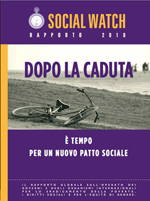Italy
|
Source: . Published on Fri, 2017-03-24 00:00
Alla vigilia del Vertice di Roma, occasione in cui i Leader dei Paesi UE si apprestano a celebrare il sessantesimo anniversario dei Trattati di Roma e discutere del futuro dell’UE, oltre 7.000 organizzazioni della società civile hanno inviato una lettera congiunta ai leader dei 10 Paesi Membri impegnati da tre anni nel negoziato per l’introduzione di una Tassa europea sulle Transazioni Finanziarie (TTF). Il futuro dell’UE passa anche dall’adozione di misure come questa che rappresentano una risposta concreta alle istanze dei cittadini sempre più schiacciati da politiche che privilegiano il potere di pochi a discapito del benessere di tutti. |
Published on Thu, 2016-09-08 20:32
Due to the lasting impact of the international financial crisis and resulting increase in poverty and insecurity, and especially due to the Government’s extensive austerity policies, Italy faces challenges in many of the areas addressed by the 2030 Agenda for Sustainable Development goal. Even in the one area that has seen a positive trend in recent years, namely, the development of renewable energy, there has been a reversal of the virtuous cycle since 2015. In the absence of a national energy plan, government policies continue to encourage fossil fuels (despite popular opposition), and large infrastructural works with new rules to eliminate environmental controls (introduced through the Stability Law in 2016) and with an increase in soil depletion. |
|
Due to the lasting impact of the international financial crisis and resulting increase in poverty and insecurity, and especially due to the Government’s extensive austerity policies, Italy faces challenges in many of the areas addressed by the 2030 Agenda for Sustainable Development goal.
Moreover, the political context is critical, the result of three changes of Government without elections, in which the executive power has taken decisive initiatives for reform in many fields, including constitutional reforms, resulting in a progressive worsening of the gap between the political action of the "palace" and the daily exercise of citizen democratic participation.
|
Published on Thu, 2013-04-11 11:20
As a whirlpool, the crisis that has been lasting for the past 5 years has hit Italy hard in 2012. The deterioration of the living conditions of a large part of the Italian population concerned especially the "working poor": in Italy, there are three million, about 15% of the total employed. Eight million Italians live with less than one thousand euro per month. The crisis has seriously damaged the middle class. |
|
As a whirlpool, the crisis that has been lasting for the past 5 years has hit Italy hard in 2012.
The country was put under the "technical” government of Mario Monti, who acted as a commissioner and subjected Italy to a shock therapy of austerity policies, similar to the structural adjustment programs imposed by the IMF. While intended to reanimate the economy, it plunged the country into a real recession under the blackmail of two parameters: the "spread" between Italy and Germany, and the Public Debt, which has grown another 10%, reaching 127,3% of the GNP (3rd quarter of 2012, according to Eurostat). It is not by chance that the Prime Minister Mario Monti has been International Advisor to Goldman Sachs.
|
|
Published on Mon, 2012-03-19 08:51
In terms of gender equity Italy lags behind the European average, and also behind some of its neighbours. This is made apparent by the publication of the Gender Equity Index (GEI) 2012, published by Social Watch on the eve of Women’s International Day, March 8. |
|
Commitments on combating poverty and social exclusion, as well as on increasing gender equality, have not been met, while policies undermine the availability and delivery of essential services. Although sustainable development is not part of the Government’s priorities, four successful referenda promoted by civil society (against nuclear power, forced privatization of water and other public services and against the exemption of the Prime Minister from the rule of law) that brought almost 27 million Italians to vote, have pushed the country in the right direction.
It is essential to review all public policies and establish a new model of development centred on the enforcement of fundamental human rights, environmental sustainability and the reduction of social inequality.
|
|
Source: . Published on Thu, 2011-02-17 08:08
» |
SUSCRIBE TO OUR NEWSLETTER







